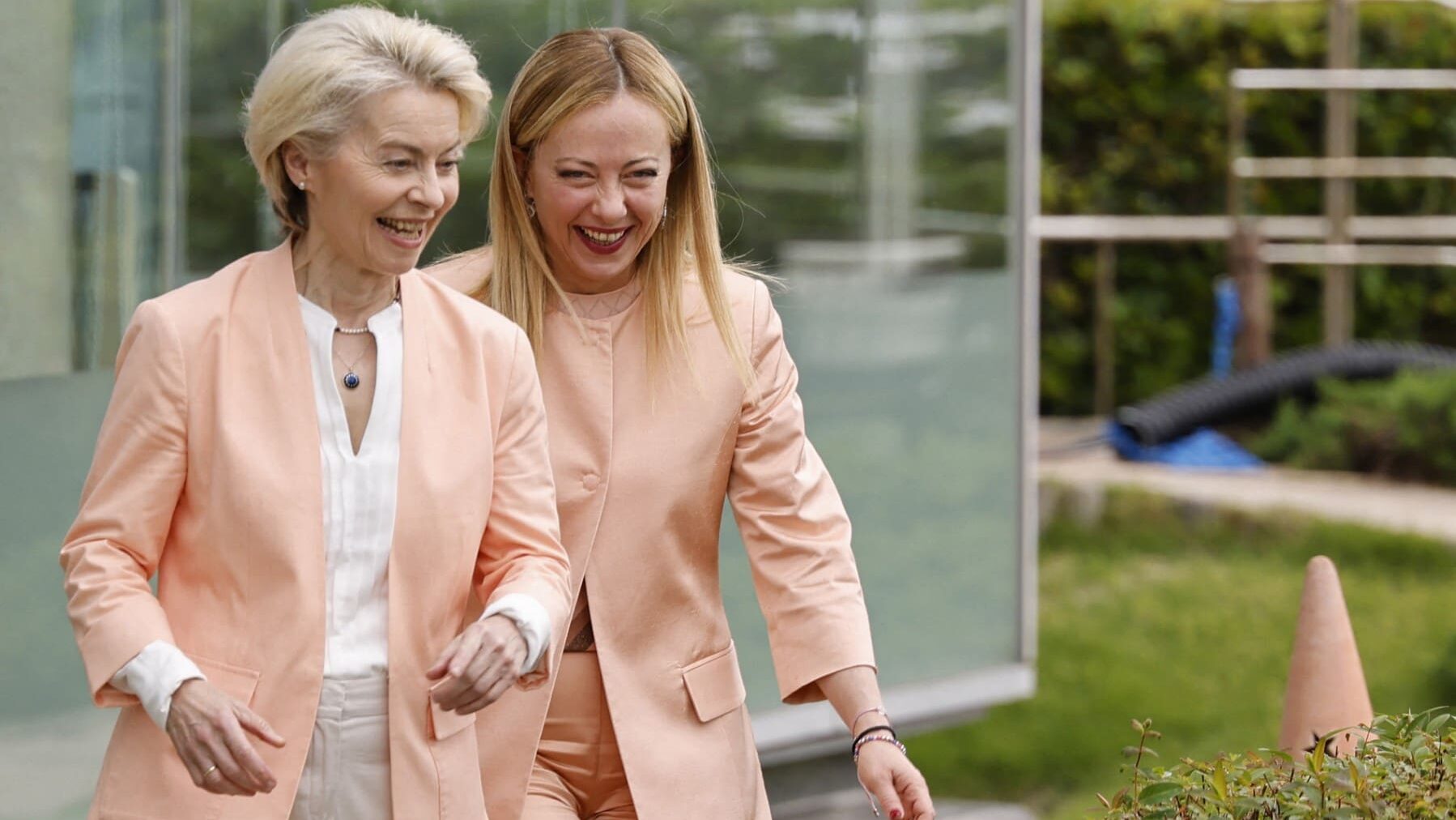
European Commission President Ursula von der Leyen and Italian PM Giorgia Meloni
Photo: Ludovic Marin / AFP
The European Conservative and Reformist (ECR) group, led by Italian PM Giorgia Meloni, is en route to becoming the third largest group in the European Parliament (EP), outnumbering the Macronist liberal Renew group’s 79 seats. After finishing up with 73 seats in last weekend’s EP election, to date, the national conservatives have expanded to 77 by admitting new member parties, the group said in a statement issued late on Wednesday, June 12th
ECR Co-President Nicola Procaccini also outlined the group’s intentions to be part of a “new center-right majority” in parliament—meaning the proposed merger with the ID group is out of the question, along with any close cooperation between the two sovereigntist groups in the next five years.
“It’s a red line,” Procaccini said about merging the two groups. “We’re jealous of the political identity of the [ECR], which has a tradition, a history, and a project that goes beyond the European Union and is linked to the British Tories, the American Republicans, the Israeli Likud.”
The ECR welcomed four new national delegations with one MEP each: from the Croatian government’s junior coalition partner, the right-wing populist Homeland Movement (DP); the Cypriot pro-unification nationalist National Popular Front (ELAM); the green-conservative Latvian United List (AS); and the Catholic-conservative Alternative Democratic Reform Party (ADR) from Luxembourg.
With four new MEPs from these parties, the ECR now officially has 77 seats, just two behind Emmanuel Macron’s liberal Renew group, currently in third place. However, the statement notes that ECR is expecting to add more delegations in further rounds of admission, with the final composition of the group subject to change until June 26th, the day its Bureau will be elected.
Procaccini (a member of Meloni’s Fratelli d’Italia) welcomed the new members in a recent interview and praised the bloc’s preferred new political direction, “advocating for a middle way that seeks to better balance competences between Brussels and national capitals,” as “credible and attractive.”
Calling ECR the “middle way” perfectly underlines Giorgia Meloni’s newfound strategy of steering the ECR toward the center by choosing more cooperation with Ursula von der Leyen’s European People’s Party (EPP) than with Marine Le Pen’s Identity and Democracy (ID) group, ECR’s traditional ally in Brussels.
Procaccini also confirmed this by spelling out ECR’s ultimate goal, which is
to be an important part of a new center-right majority in the next European Parliament, … making the EU a thriving place for citizens, rather than a haven for activists and bureaucrats.
While replacing the current center-left one with a “center-right majority” sounds good on paper, what Procaccini neglected to spell out is that the only viable combination of coalition partners under this name would be the centrist EPP and the liberal Renew, two of the three groups making up the current “Ursula coalition.” The three now have 345 seats between them, only 16 less than what’s needed for a majority, which is neither easy nor impossible to reach.
This means that the Parliament’s leading coalition could change by replacing its social democrat faction (S&D) with the ECR. A shift to the right, yes, but one necessarily requiring ECR to also compromise by shifting to the left.
An early sign that ECR is willing to compromise has already been given by Procaccini, who confirmed that the ECR is ready to back the EPP’s incumbent parliamentary president Roberta Metsola, in exchange for a second EP vice presidential seat in the Parliament Bureau.
On the other hand, Procaccini refused to give a straight answer when asked about whether ECR would also back von der Leyen’s re-election as Commission President,—although it will clearly be the price to secure a center-right majority in case von der Leyen does get nominated by the Council.
ECR needs caution about who else it wants to admit to fill up the remaining seats, because some delegations are as taboo for its new allies in EPP as some members of the ID group.
Although the party hasn’t formally applied yet, the Hungarian Fidesz’ 11 seats, for instance, would be a major help in realizing ECR’s goal. However, the EPP and von der Leyen had made it clear that they consider cooperation with PM Viktor Orbán’s party a red line—as is the case with the Romanian nationalist AUR party. AUR wants to bring its six seats to ECR, but its explicitly anti-Ukrainian rhetoric makes negotiations problematic.
